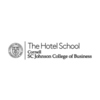Cornell Report Focuses on Travel Planners' Decision-Making
A new report from the Cornell Center for Hospitality Research (CHR) at the School of
Hotel Administration documents the series of thought processes that consumers use to make their travel plans. The CHR report examines how the hospitality industry can connect with those processes to assist consumers' decision making and trip planning. The report, "Consumer Thinking in Decision-Making: Applying a Cognitive Framework to Trip Planning," by Kimberly M. Williams, applies an eight-point cognitive framework to travel planning and outlines the implications of this framework. The report is available at no charge from the CHR.The cognitive framework, which is currently used in education, improves the industry's
understanding of consumers' thought processes. "I conducted two pilot studies and I offer my own personal experience to demonstrate how this framework of eight thinking types operates in trip planning," said Williams, who is a teaching support specialist with the Graduate Research in Teaching Fellows program in the Cornell Center for Teaching Excellence, and is also on the graduate faculty at Plymouth State University. "We're still learning what part of consumer decision making is beyond the person's awareness, but this study encourages respondents to become aware of the thinking they apply to their trip planning. That way we can learn more about their thought processes. What is clear, though, is that familiarity and social connections have a strong influence on thinking processes generally, and on trip planning in particular."The report explains the framework's use for consumer decision-making and suggests
ways that may help the industry better understand and address the cognition that happens as consumers make complex travel decisions. The eight forms of thinking are: (1) Defining in context, (2) Describing attributes, (3) Sequencing, (4) Causal reasoning, (5) Using analogies, (6) Comparing and contrasting, (7) Categorical reasoning, and (8) Spatial reasoning.The studies demonstrate that some of these forms of cognition appear to apply more
strongly than others in trip planning. Frequently used cognitive categories include determining the context of the trip, describing and comparing attributes, considering spatial or location issues, and focusing on the sequence of travel events. Williams concludes that the industry might consider ways to facilitate each of these forms of thinking at different stages of the trip-planning process. In particular, the industry can focus on taking advantage of the influence of social connections and people's desire for familiarity, as they make their travel choices.About the Center for Hospitality Research
The purpose of the Center for Hospitality Research is to enable and conduct research of significance to the global hospitality and related service industries. CHR also works to improve the connections between academe and industry, continuing the School of Hotel Administration's long-standing tradition of service to the hospitality industry. Founded in 1992, CHR remains the industry's foremost creator and distributor of timely research, all of which is posted at no charge for all to use. In addition to its industry advisory board, CHR convenes several industry roundtables each year for the purpose of identifying new issues affecting the hospitality industry.
Center Members: Accenture • Access Point Financial, Inc. • Barclaycard US • Cvent • Davis & Gilbert LLP • Deloitte & Touche USA LLP • DerbySoft • Four Seasons Hotels and Resorts • Fox Rothschild LLP • Hilton Worldwide • Host Hotels & Resorts • Hyatt Hotels Corporation • IDeaS Revenue Solutions • InterContinental Hotels Group • Jumeirah Group • Marriott International • NTT DATA • Preferred Hotels & Resorts • priceline.com • PwC • The Rainmaker Group • RateGain • ReviewPro • Revinate • Sabre Hospitality Solutions • STR • Taj Hotels Resorts and Palaces • Tata Consultancy Services • Wipro EcoEnergy • Wyndham Hotel Group
Jane Henion
607.255.9780
CHR
